#Take that Chinese censorship
Explore tagged Tumblr posts
Text
if this pink haired person in link click isn't trans i'm gonna tear my hair out... listen. i know i was reaching about iris in tye but if every single thing they're doing to set this character up in link click is a red herring i'm gonna be so pissed off... lu guong calling them "he", other characters deliberately avoiding pronouns for them, the pink haired little girl in the flashback being told she has "the pulse of a boy", that little girl and the grown boy both being mute.... do not play with me right now link click
#idk what the lgbt censorship in chinese anime is like but there was some homoerotic stuff early in s1#that makes me think theres a basis for this....#i feel like any other explanation for this character is gonna be so mid and convoluted 😭#this explanation really takes advantage of the show's premise and the character's abilities to do something interesting....#im suspicious about that 'my brother' thing though.... dont do something boring please pleaseeeee#lc
2 notes
·
View notes
Text
AUGRHRGGE I NEED TO DISCUSS BWHY HI3’S QUEERNESS MEANS SO MUCH TO ME WITH A FRIEND!!!!!!!!
#preferably irl or over voice i’m gonna die it’s so sooo fascinating i wanna discuss it w my chinese friends who played hoyo games before#so bad bc they’ll understand how i feel completely but they’re also busy.#personal#it’s like acknowledging that some of it will inevitably be used as some straight guys fantasy#and that some of the visual imagery is intentionally there in part to extrapolate that#which in turn sexualizes children and how that’s sometimes incongruent w the story itself#(← see aw)#but also how none of that will ever take away from the genuine beauty of the writing where they’ve run into problems w censorship bc of it#it will never ever take away from how much soul the queer rep has esp within the characters narratives and how that itself shows how much#the game cares about these relationships. how unabashedly queer the characters are without any shame about it..
2 notes
·
View notes
Text
just saw someone say that the only reason tumblr users hate tiktok is because of sinophobia? maybe for fox news but literally nobody is saying that here
#its literally no more of a data risk than most other social media#also objectively its an app that incentivizes you to post yr face (not something you want attached to yr takes so you can still get a job)#and very sanitized for oppressive classes and advertisers (the beauty filter files + censorship and shadowbanning + most followed tiktokers#do brand deals)#and subjectively. everyones takes are fucking unhinged media literacy is trash and 'unalive' is an eyesore#eagle eyed viewers may notice that i did not mention the chinese government
5 notes
·
View notes
Text
Small addition: I think from what I read, it can be fined $5 000 per day multiplied by each user it provides service to.
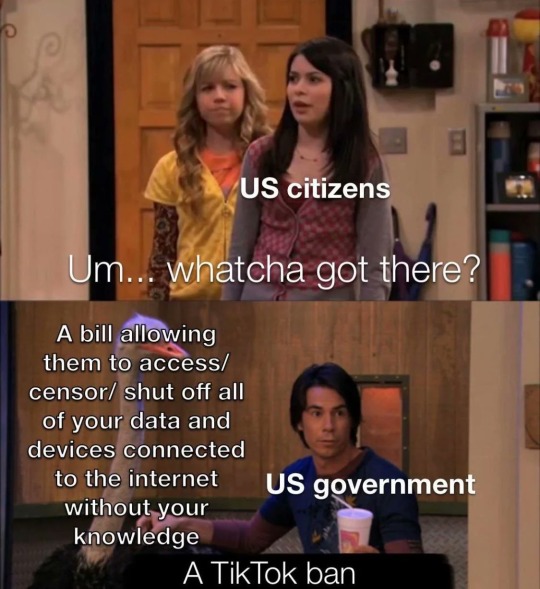
#is2g I'm tired of so much of y'all's shit#you really do manage to stumble into conspiracy at every turn#I'm so sorry you have to hear this but there is no content on tiktok that isnt available literally everywhere else you can post short videos#and considering every other social media platform and video site is riddled with pro palestinian content and messages to organize#the idea the govt is doing this to stop you from talking about these things is so dumb i cant believe y'all are parroting this shit#literally a fuck ton of palestinian activists and journalists are on twitter and instagram so idk idk#maybe y'all are falling for tiktok panic videos that tiktok itself is promoting to you for self interested reasons#and you're not willing to admit that to yourselves#'theyre trying to narrow your worldview' no actually if they wanted to do that#theyd probably take a page out of china's book and make their own version of the same app that no one outside the country is able to get#AND make tiktok unavailable :)#hope this helps <3#tiktok was made to cater to a western audience while chinese citizens and ONLY people in china have access to douyin#so let's not sit here and pretend that bytedance isn't fine with censorship when it serves at least one government <3
90K notes
·
View notes
Text
the Earth will never be healed again until China starts producing stuff with a sufficient amount of genderfuckery again. nearly all of the most compelling stuff China has ever produced has featured a significant amount of genderfuckery. that and the gay shit. send X or whatever you fools say now
#cursing#sorry i tag swears bc they are outside of my usual speech patter#however they are necessary here.#there are people who want to make the good stuff. gayness and the genders and whatnot. we won't know peace until they do so again#when i took the chinese cinema course I really started to fall in love with yhe defining qualities of chinese production#and the world needs chinese creators to be permitted to stretch their beautifully choreographed highly stylized slow-motion wings ok#actually the ways some of the great filmmakers of the chinese tradition add naturalism is so unique and enrapturing#just imagine if we were regularly getting the untamed but filmed by zhang yimou and funded like filmmaking is free and they kiss in the end#I am going to watch the fairy and demon one#but I don't have too high of hopes. i hope it will be fun! but I don't expect the to lean all the way in#what I'm deally wanting to see is one like the nine-headed demon thing#midsummer night's dream wuxia or xianxia#like where is romance and attraction and all of it DURING the genderedness OK#LEAN IN#the 9 eyed demon looks HORRIBLE mostly because there is a lack of love w the demon (looks abusive and boring)#but ALSO because they refuse to Lean All The Way In#go all the way!! take it there!! don't be afraid!#easy to say from here I guess. without the chinese government breathing down my neck#blabbering about correct messaging#you know we actually just completely skipped the era of the cultural revolution in filmmaking. as there were “no movies of merit” produced#don't do this again China. please relax the freaking censoring 😭😭#man I just feel so bad for the creators that make things they love only to have then completely slashed or censored into emptiness#the fact that the untamed made something BETTER than the original because the used censorship like poetic form#its so beautiful. so chefs kiss#but my wish for the talented creators of china is that they will not have this form forced on their work forever.#most of the time it doesn't do what it dod the the untamed#and even that was produced before the got CRAZY
1 note
·
View note
Text
The majority of censorship is self-censorship

I'm on tour with my new novel The Bezzle! Catch me TONIGHT in SAN DIEGO (Feb 22, Mysterious Galaxy). After that, it's LA (Saturday night, with Adam Conover), Seattle (Monday, with Neal Stephenson), then Portland, Phoenix and more!

I know a lot of polymaths, but Ada Palmer takes the cake: brilliant science fiction writer, brilliant historian, brilliant librettist, brilliant singer, and then some:
https://pluralistic.net/2022/02/10/monopoly-begets-monopoly/#terra-ignota
Palmer is a friend and a colleague. In 2018, she, Adrian Johns and I collaborated on "Censorship, Information Control, & Information Revolutions from Printing Press to Internet," a series of grad seminars at the U Chicago History department (where Ada is a tenured prof, specializing in the Inquisition and Renaissance forbidden knowledge):
https://ifk.uchicago.edu/research/faculty-fellow-projects/censorship-information-control-information-revolutions-from-printing-press/
The project had its origins in a party game that Ada and I used to play at SF conventions: Ada would describe a way that the Inquisitions' censors attacked the printing press, and I'd find an extremely parallel maneuver from governments, the entertainment industry or other entities from the much more recent history of internet censorship battles.
With the seminars, we took it to the next level. Each 3h long session featured a roster of speakers from many disciplines, explaining everything from how encryption works to how white nationalists who were radicalized in Vietnam formed an armored-car robbery gang to finance modems and Apple ][+s to link up neo-Nazis across the USA.
We borrowed the structure of these sessions from science fiction conventions, home to a very specific kind of panel that doesn't always work, but when it does, it's fantastic. It was a natural choice: after all, Ada and I know each other through science fiction.
Even if you're not an sf person, you've probably heard of the Hugo Awards, the most prestigious awards in the field, voted on each year by attendees of the annual World Science Fiction Convention (Worldcon). And even if you're not an sf fan, you might have heard about a scandal involving the Hugo Awards, which were held last year in China, a first:
https://www.nbcnews.com/news/world/science-fiction-authors-excluded-hugo-awards-china-rcna139134
A little background: each year's Worldcon is run by a committee of volunteers. These volunteers put together bids to host the Worldcon, and canvass Worldcon attendees to vote in favor of their bid. For many years, a group of Chinese fans attempted to field a successful bid to host a Worldcon, and, eventually, they won.
At the time, there were many concerns: about traveling to a country with a poor human rights record and a reputation for censorship, and about the logistics of customary Worldcon attendees getting visas. During this debate, many international fans pointed to the poor human rights record in the USA (which has hosted the vast majority of Worldcons since their inception), and the absolute ghastly rigmarole the US government subjects many foreign visitors to when they seek visas to come to the US for conventions.
Whatever side of this debate you came down on, it couldn't be denied that the Chinese Worldcon rang a lot of alarm-bells. Communications were spotty, and then the con was unceremoniously rescheduled for months after the original scheduled date, without any good explanation. Rumors swirled of Chinese petty officials muscling their way into the con's administration.
But the real alarm bells started clanging after the Hugo Award ceremony. Normally, after the Hugos are given out, attendees are given paper handouts tallying the nominations and votes, and those numbers are also simultaneously published online. Technically, the Hugo committee has a grace period of some weeks before this data must be published, but at every Worldcon I've attended over the past 30+ years, I left the Hugos with a data-sheet in my hand.
Then, in early December, at the very last moment, the Hugo committee released its data – and all hell broke loose. Numerous, acclaimed works had been unilaterally "disqualified" from the ballot. Many of these were written by writers from the Chinese diaspora, but some works – like an episode of Neil Gaiman's Sandman – were seemingly unconnected to any national considerations.
Readers and writers erupted in outrage, demanding to know what had happened. The Hugo administrators – Americans and Canadians who'd volunteered in those roles for many years and were widely viewed as being members in good standing of the community – were either silent or responded with rude and insulting remarks. One thing they didn't do was explain themselves.
The absence of facts left a void that rumors and speculation rushed in to fill. Stories of Chinese official censorship swirled online, and along with them, a kind of I-told-you-so: China should never have been home to a Worldcon, the country's authoritarian national politics are fundamentally incompatible with a literary festival.
As the outrage mounted and the scandal breached from the confines of science fiction fans and writers to the wider world, more details kept emerging. A damning set of internal leaks revealed that it was those long-serving American and Canadian volunteers who decided to censor the ballot. They did so out of a vague sense that the Chinese state would visit some unspecified sanction on the con if politically unpalatable works appeared on the Hugo ballot. Incredibly, they even compiled clumsy dossiers on nominees, disqualifying one nominee out of a mistaken belief that he had once visited Tibet (it was actually Nepal).
There's no evidence that the Chinese state asked these people to do this. Likewise, it wasn't pressure from the Chinese state that caused them to throw out hundreds of ballots cast by Chinese fans, whom they believed were voting for a "slate" of works (it's not clear if this is the case, but slate voting is permitted under Hugo rules).
All this has raised many questions about the future of the Hugo Awards, and the status of the awards that were given in China. There's widespread concern that Chinese fans involved with the con may face state retaliation due to the negative press that these shenanigans stirred up.
But there's also a lot of questions about censorship, and the nature of both state and private censorship, and the relationship between the two. These are questions that Ada is extremely well-poised to answer; indeed, they're the subject of her book-in-progress, entitled Why We Censor: from the Inquisition to the Internet.
In a magisterial essay for Reactor, Palmer stakes out her central thesis: "The majority of censorship is self-censorship, but the majority of self-censorship is intentionally cultivated by an outside power":
https://reactormag.com/tools-for-thinking-about-censorship/
States – even very powerful states – that wish to censor lack the resources to accomplish totalizing censorship of the sort depicted in Nineteen Eighty-Four. They can't go from house to house, searching every nook and cranny for copies of forbidden literature. The only way to kill an idea is to stop people from expressing it in the first place. Convincing people to censor themselves is, "dollar for dollar and man-hour for man-hour, much cheaper and more impactful than anything else a censorious regime can do."
Ada invokes examples modern and ancient, including from her own area of specialty, the Inquisition and its treatment of Gailileo. The Inquistions didn't set out to silence Galileo. If that had been its objective, it could have just assassinated him. This was cheap, easy and reliable! Instead, the Inquisition persecuted Galileo, in a very high-profile manner, making him and his ideas far more famous.
But this isn't some early example of Inquisitorial Streisand Effect. The point of persecuting Galileo was to convince Descartes to self-censor, which he did. He took his manuscript back from the publisher and cut the sections the Inquisition was likely to find offensive. It wasn't just Descartes: "thousands of other major thinkers of the time wrote differently, spoke differently, chose different projects, and passed different ideas on to the next century because they self-censored after the Galileo trial."
This is direct self-censorship, where people are frightened into silencing themselves. But there's another form of censorship, which Ada calls "middlemen censorship." That's when someone other than the government censors a work because they fear what the government would do if they didn't. Think of Scholastic's cowardly decision to pull inclusive, LGBTQ books out of its book fair selections even though no one had ordered them to do so:
https://www.nytimes.com/2023/05/06/books/scholastic-book-racism-maggie-tokuda-hall.html
This is a form of censorship outsourcing, and it "multiplies the manpower of a censorship system by the number of individuals within its power." The censoring body doesn't need to hire people to search everyone's houses for offensive books – it can frighten editors, publishers, distributors, booksellers and librarians into suppressing the books in the first place.
This outsourcing blurs the line between state and private surveillance. Think about comics. After a series of high-profile Congressional hearings about the supposed danger of comics to impressionable young minds, the comics industry undertook a regime of self-censorship, through which the private Comics Code Authority would vet comings for "dangerous" content before allowing its seal of approval to appear on the comics' covers. Distributors and retailers refused to carry books without a CCA stamp, so publishers refused to publish books unless they could get a CCA stamp.
The CCA was unaccountable, capricious – and racist. By the 60s and 70s, it became clear that comic about Black characters were subjected to much tighter scrutiny than comics featuring white heroes. The CCA would reject "a drop of sweat on the forehead of a Black astronaut as 'too graphic' since it 'could be mistaken for blood.'" Every comic that got sent back by the CCA meant long, brutal reworkings by writers and illustrators to get them past the censors.
The US government never censored heroes like Black Panther, but the chain of events that created the CCA "middleman censors" made sure that Black Panther appeared in far fewer comics starring Marvel's most prominent Black character. An analysis of censorship that tries to draw a line between private and public censorship would say that the government played no role in Black Panther's banishment to obscurity – but without Congressional action, Black Panther would never have faced censorship.
This is why attempts to cleanly divide public and private censorship always break down. Many people will tell you that when Twitter or Facebook blocks content they disagree with, that's not censorship, since censorship is government action, and these are private actors. What they mean is that Twitter and Facebook censorship doesn't violate the First Amendment, but it's perfectly possible to infringe on free speech without violating the US Constitution. What's more, if the government fails to prevent monopolization of our speech forums – like social media – and also declines to offer its own public speech forums that are bound to respect the First Amendment, we can end up with government choices that produce an environment in which some ideas are suppressed wherever they might find an audience – all without violating the Constitution:
https://locusmag.com/2020/01/cory-doctorow-inaction-is-a-form-of-action/
The great censorious regimes of the past – the USSR, the Inquisition – left behind vast troves of bureaucratic records, and these records are full of complaints about the censors' lack of resources. They didn't have the manpower, the office space, the money or the power to erase the ideas they were ordered to suppress. As Ada notes, "In the period that Spain’s Inquisition was wildly out of Rome’s control, the Roman Inquisition even printed manuals to guide its Inquisitors on how to bluff their way through pretending they were on top of what Spain was doing!"
Censors have always done – and still do – their work not by wielding power, but by projecting it. Even the most powerful state actors are not powerful enough to truly censor, in the sense of confiscating every work expressing an idea and punishing everyone who creates such a work. Instead, when they rely on self-censorship, both by individuals and by intermediaries. When censors act to block one work and not another, or when they punish one transgressor while another is free to speak, it's tempting to think that they are following some arcane ruleset that defines when enforcement is strict and when it's weak. But the truth is, they censor erratically because they are too weak to censor comprehensively.
Spectacular acts of censorship and punishment are a performance, "to change the way people act and think." Censors "seek out actions that can cause the maximum number of people to notice and feel their presence, with a minimum of expense and manpower."
The censor can only succeed by convincing us to do their work for them. That's why drawing a line between state censorship and private censorship is such a misleading exercise. Censorship is, and always has been, a public-private partnership.

If you'd like an essay-formatted version of this post to read or share, here's a link to it on pluralistic.net, my surveillance-free, ad-free, tracker-free blog:
https://pluralistic.net/2024/02/22/self-censorship/#hugos
#pluralistic#ada palmer#worldcon#hugos#china#science fiction#fanac#publishing#censorship#systems of information control during information revolutions#scholarship
2K notes
·
View notes
Text
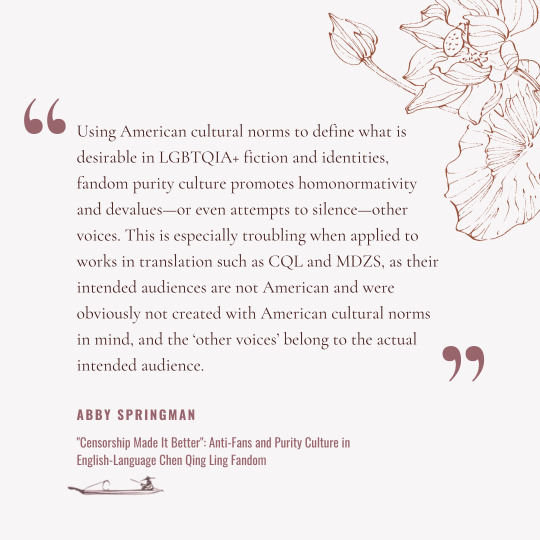
Chapter Spotlight 8:
"'Censorship Made It Better': Anti-Fans and Purity Culture in English-Language Chen Qing Ling Fandom" by Abby Springman
Describe your topic/chapter in one sentence/one meme/140 characters.
Rejoice! MDZS has been cancelled!
What drew you to this topic?
When I got into CQL fandom and started lurking on its outskirts on Twitter, I started getting this weird sense of déjà vu. There was this bizarre similarity between the arguments I was seeing about the aspects of CQL/MDZS and their fandoms being "problematic" from a progressive, social justice point of view and the demands for censorship in American libraries that conservative groups were (and still are) making at an alarmingly increasing rate. In an attempt to make sense of this, I fell down what ended up being a really long rabbit hole, and, well, here we are.
Was there anything you were surprised to discover while researching?
I was surprised by the wide variety of fannish backgrounds found amongst members of English-language CQL fandom! I'm not used to seeing so many different "areas" of fandom intersect over a single piece of media like this. Some folks are primarily into the live action movies and TV shows side of things, some are mostly in bandom, some (like me) are traditionally a part of the anime, manga, and gaming contingent, etc. I think that's fascinating, honestly.
Did researching/writing your chapter change how you saw the text, the fandom, or the media? How so?
I didn't use the block button on Tumblr or Twitter for anyone in the fandom while I was working on my chapter. It definitely changed how I saw fandom on those platforms—literally. It really highlighted how much power social media algorithms have over what kind of content is presented to us front and center.
If there’s one thing you hope the fandom takes away from your article, what would it be?
I'll be thrilled if it makes people think about "problematic" content in less black-and-white terms. They don't have to necessarily agree with my conclusions! But if my words make even one person stop and think more about context before posting a reactionary comment, then that would be great.
If you were isekai-ed into MDZS/CQL, what sect affiliation would you choose and why?
The Lan. My existing skills are most likely to be applicable there (see: the library), it seems easy to find some peace and quiet when you need it, there are bunnies, and Hanguang-jun is there.
Chaotic one-sentence pitch to get your friends into MDZS/CQL?
My elevator pitch for CQL has historically been, "It's the adaptation of a book about a gay necromancer, except they can't actually show the gay romance or the zombies on screen."
What is one (1) book/media you would recommend to a MDZS/CQL fan? Tell us about it.
Strange Tales from a Chinese Studio by Pu Songling. It's probably the most accessible collection of Chinese stories of the supernatural available in English. If MDZS/CQL was your first exposure to traditional Chinese cultural beliefs about ghosts, exorcisms, and the like, this is a great introduction to the less xianxia-specific aspects. If that isn't the case for you, I still highly recommend it on its own merits!
Character you keep getting in those "which MDZS/CQL character are you" quizzes?
Wen Ning
Anything to say to potential readers of the collection?
Thank you, and I'm sorry—no, that's a joke. More seriously, I really am thankful for anyone interested in the collection. It's the product of years of hard work by many people, and I'm sure there's an interesting chapter in there for everyone.
(FAQ) (all posts on Catching Chen Qing Ling)
#MDZS#CQL#The Untamed#Grandmaster of Demonic Cultivation#Catching Chen Qing Ling#CQL academic collection#CQL CFP#Chen Qing Ling#Mo Dao Zu Shi#CQL meta#MDZS meta
215 notes
·
View notes
Text
I too watched the hbomberguy video and went straight to Twitter, whereupon I found that James Somerton had mentioned danmei in one of his videos and it made everyone mad, so I went looking and. yeah here's a full transcription of his just completely incorrect coverage of cql and mdzs from "Hollywood's (Gay) China Problem" so you don't have to watch it and give him views:
"The 2019 fantasy series The Untamed, featuring an unlikely bond between a man with magic powers and a stoic prince, started an online craze over the pair's implicit romance, but the show's promotion focused on its portrayal of Chinese traditional culture, a push consistent with Chinese communist party propaganda.
The show was... Queerbait-y. But the novel on which it was based [shows a picture of the fanmade cover for The Grandmaster of Demonic Cultivation made by fan translator team Exiled Rebels] certainly was not. That featured a very explicit love story between the two main characters, but was self-censored when adapted to meet the censorship guidelines of the Xi Jinping government. But it didn't matter. Like so much queerbaiting before, people saw through the weak veneer of heterosexuality. They "took the bait", so to speak. The series has accumulated a total of 9.5 billion views in China as of this summer, and had also received an international release via Netflix. It was described as a global phenomenon, taking off like no BL series before it, making its way all around Asia and with the Netflix deal, all across Europe and North America as well.
Tencent, the Chinese streaming platform it originated on, saw 2.6 million new subscribers to the service when it was released. And WeTV, an app that lets you watch BL content anywhere in the world, saw growth of 250% while the show was airing. In January of 2020, the cast members planned to embark on a multi-city, worldwide fan meeting tour. Cities included Bangkok, Singapore, Tokyo, Seoul, Macau, Kuala Lumpur, Toronto, Los Angeles, New York... But it was cancelled due to COVID-19.
Even the Chinese government has endorsed it. The overseas popularity of these romantic sword-wielding heroes is often highlighted in Chinese media coverage focusing on the massive overseas streaming numbers and its ability to build a growing appreciation of the charm of Chinese culture."
763 notes
·
View notes
Text
@ all of y’all in the tags going “it’ll never air”, “we’ll be immortal before we get immortality”, “yeah we’ll never see it”
First of all I would like to say that this prompted a deep dive into the mechanics of media censorship in modern day China and now I’m very angry on many different levels and second of all I would like to say
DENIAL IS A RIVER IN EGYPT and I WILL SEE THIS AIRED BEFORE I DIE
thank you for your time 🤡
okay but WHO WAS GONNA TELL ME that luO YUNXI!!!! is cast as ChU WanNINg? I BEG YOUR FINEST PARDON?
someone’s gonna need to wipe me off the floor if Immortality ever airs because i am not ready
so you’re telling me that this

is the man gonna be playing THE pathetic wet cat, the “no one could ever possibly love me”

the stoic, the graceful yuheng elder

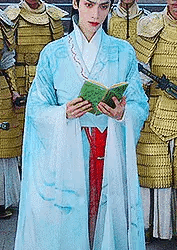
the desperately repressed
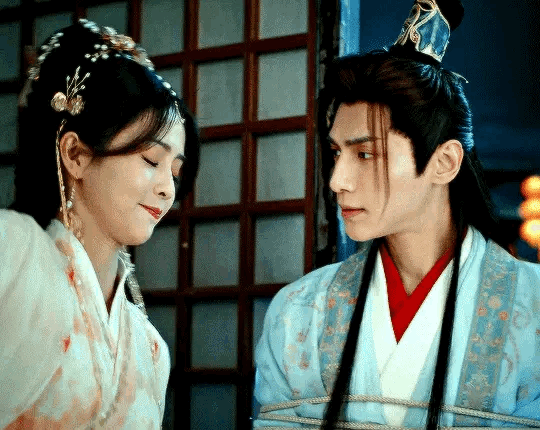

The White Cat, Chu Wanning????


i’m done. deceased. wake me up when it’s out
image credits: gifs 1&2 @xiaosean - 3&4 @kimp05 - 5 @trendingdrama - 6 @yilinglaozu - image 7 @inthefaceofadaffodil (also OP of the inciting post mentioned in the tags) - 8 official image
#do I understand that under current political pressures it is highly unlikely that it will be released (through official channels) - yes#(I still want to know who’s doing the leaks and why#BUT I believe in the power of collective will and a little bit of manifestation pixie dust#is it insane that this was ever produced in the first place? oh 100%#would I rather it not be released than edited within an inch of its life to pass censorship? also yes#and regarding oppressive regimes#I get that it’s apples and oranges but look at what’s happened/happening in Bangladesh#empires rise and fall - dictators die and states fall on their swords#god I hope this doesn’t get me blacklisted#anyways#my point is I’m going to choose to be optimistic and believe that even if it takes a little while longer we will see change in our lifetime#we’ve already made so much progress#we can make it happen ~~~#sinna rambles#sinna roublogs#immortality#hyx#hao yi xing#2ha#erha#erha he ta de bai mao shizun#hyx bts#danmei#aisling speaks#xianxia#chinese bl#cdrama
245 notes
·
View notes
Note
i totally take the point about how chinese people experience racism online and most of them don't want to leave the chinese internet, but i'm uncomfortable with the defense of censorship. if it's not ok for the us to ban tiktok, how is it ok for china to ban youtube? there are a lot of things to like about china but you can't pretend their problems aren't real. there's no good reason why chinese people shouldn't be allowed on western sites, even if they don't want to visit them.
i'm sorry did we read the same post?
296 notes
·
View notes
Text
Pride Petty Watch
Long story short, I owe the BL gods, so I'll be watching TWO series from my Petty List during the month of June. This list includes shows I haven't watched for purely petty reasons, so I'm asking the crowd to pick the two shows I will watch from all the MAME series, some censored Chinese bromances, a few sexual tension-filled Korean bromances, and one wild card.
I'm making my first ever poll, so whichever two series get the highest numbers will be the two I watch. And for all the kind people in the crowd, this is not the time to think about me. Pick your favorite. And for all the people who I annoy on the daily with my wild ass takes that piss you off, pick TharnType. But there is a possibility of a secret thirteenth option that would hurt me much worse . . .
The petty ass reasons are below the poll.
Disclaimer: If you're going to read the petty ass reasons, I need you to understand these are PETTY ASS REASONS, so don't try to hit me with 2,000 words about why me not watching censored bromances is a problem or why me not liking your fave hurts your feelings. Nah. Pick a show!
MAME

Love By Chance
This show came out at the end of 2018, and I watched the first episode, maybe first two, and thought it was boring. Then, in 2019, I saw a GIF of the locker scene, so I recommitted. I made it past the first episode just when the PerthSaint drama started spilling out everywhere, so I chucked the deuces and haven't returned since.

TharnType
For some reason, I couldn't find the first episode when it aired. Then, I found out how the first episode ended. Then, I found out about Type's past. Then, I just kept finding out more awful stuff until eventually the MewGulf shit finally hit the fan, and I was still reeling from the PerthSaint drama (and the emerging ZeeSaint chaos). At this point, I've built this show up so much that I'm afraid to see what it is actually about.
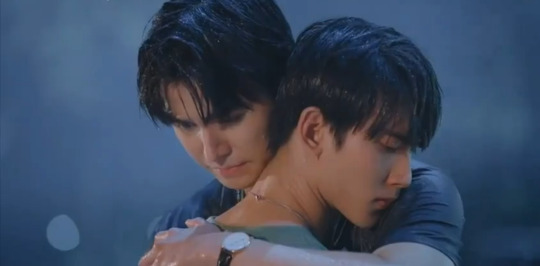
Don't Say No
A story of another GIF of a locker room scene sucking me in! After the first two MAME pairs blew up, I believed her shows were cursed, so I opted out of watching this one even though I thought it would be the one to vibe with me the most. But the biggest reason was because the main characters came from TharnType, so I felt like I would have to watch TharnType to understand this show, which was a big hell nah.

Love in the Air
I watched this through mutuals on my dash, so I feel like I did watch it. It is also the highest rated MAME series, so I had faith in it. However, when I found out about Sky's past, TharnType's ghost popped back up, and I realized this demon of a show is gonna haunt me in every MAME series.
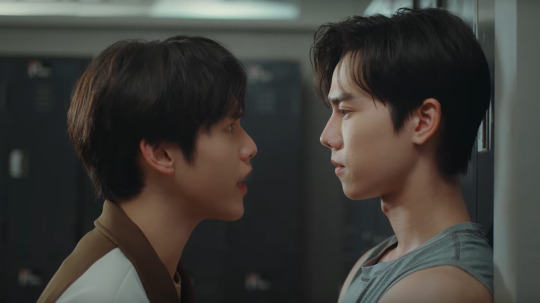
The Wedding Plan
Y'all hated one of the leads so much while it was airing that I now hate him, and I don't think I can let that go, so I'm coming in with pre-hate and TharnType's ghost, but on top of that, some of y'all said it was boring. But what is boring in a MAME series? Consent? Not kidnapping someone? I never got answers, so I'm very conflicted about this show.
Censored Chinese
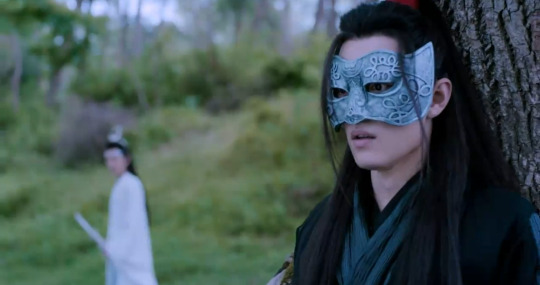
The Untamed
It's color coded, but FIFTY FUCKING EPISODES! What is this shit? Grey's Anatomy? The fuck! Second, once China pulled Addicted, I was holding grudges for life because it crossed from entertainment censorship into real-world oppression, so I could not bring myself to support media from a country that openly discriminates against the queers when I live in America where our highest court is just one Supreme Court Justice away from making us all live in the damn Mojo Dojo Casa House.
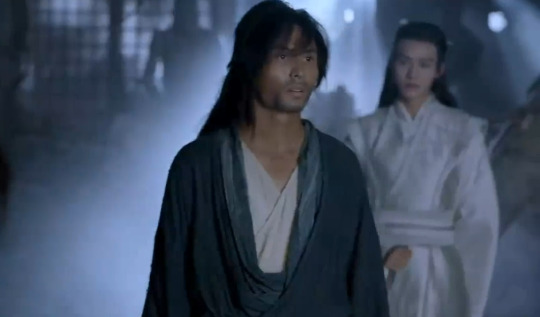
Word of Honor
It's color coded, but THIRTY-SIX FUCKING EPISODES! What is this shit? Supernatural?! The fuck! Second, I don't know the difference between this and The Untamed. Both are color-coded, one of them has a lot of uncles (?), one of them has awful facial hair, and they all have pretty outfits. Every time someone makes a reference about these shows, I just nod the same way I do when people mention Star Wars because none of it makes sense.
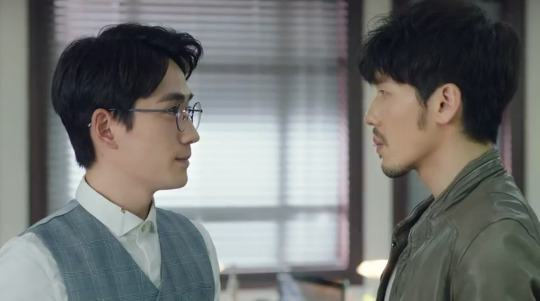
Guardian
I spent two years believing Killer and Healer was Guardian. I haven't watched either, but I thought they were the same show. Honestly, if this show wins, I might just watch Killer and Healer because I will forget they are not the same show. Don't they both solve cases? And because it's China, past lives must be involved, no? I'm looking at their MDLs as I write this, and I'm still not convinced they are different.
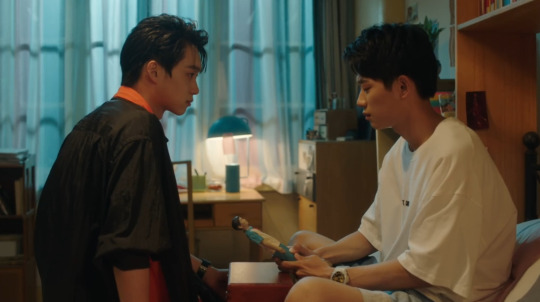
Stay with Me
It's color coded, but I know how it ends, and word on the street is that IS the ending since a second season seems unlikely. China couldn't just let me be hurt over Addicted, the original. No. Gotta hurt me again with Addicted, the remake. Rude af.
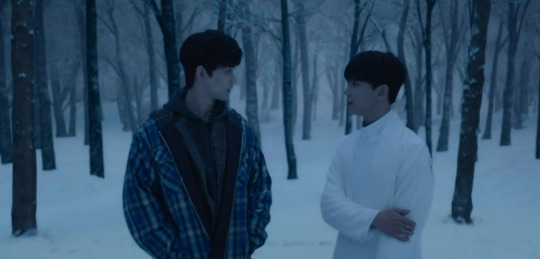
The Spirealm
First off, SEVENTY-EIGHT FUCKING EPISODES! What is this shit? Law & Order: SVU?! The fuck! I know how this ends, and it ain't happy! I don't care how people are trying to spin it, so to sit through SEVENTY-EIGHT DAMN EPISODES just for that ending already has me irate. And don't try telling me Viki combined episodes so it's only thirty-four. That's still a lot. However, everybody who has watched it says it's phenomenal, so is the pain worth it or are these people all lying so they convince themselves it was worth it?
Korean Bromance
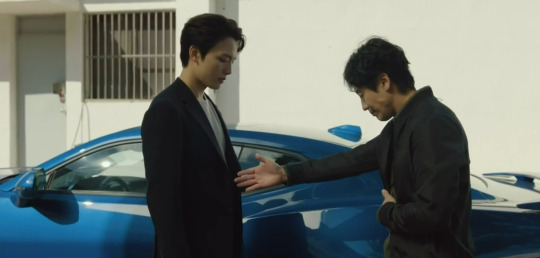
Beyond Evil
With most Korean dramas, I feel like I missing something important. Like some part of the story does not click with me and I stay lost for the rest of the show. I suck it up for the queers, but the not-queers-but-it-is-queer shows . . . nah, and especially one about cops . . . (-_-). Also, The Worst of Evil just showed, and it was another reminder that I need these cops to quit their jobs and just screw each other. Embrace "Be Gay. Do Crime"
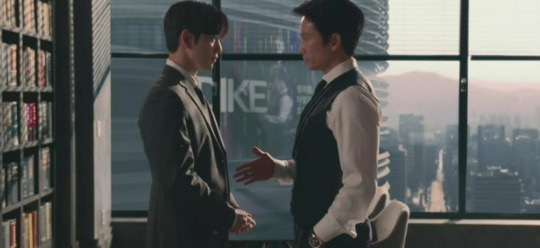
The Devil Judge
I know enough about Kpop to know GOT7 would not let one of its members kiss a man in this show. I looked at those GIFs of Jeff Satur and Jackson Wang on their show knowing damn well that if Wang got too close to Satur, an entire management team would have ascended from hell and kidnapped both of them, so the promo for this show was so wild because it felt queerbait-adjacent, and I was salty about it.
WILD CARD!
This option will be automatically unlocked IF this stupid little poll gets 216 votes, so I have high hopes this will not happen since I ain't that popular and I hate this wild card which is . . .
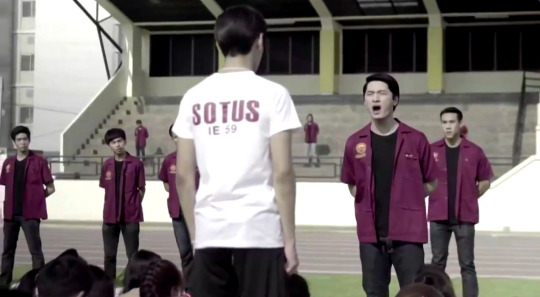
SOTUS
This show is my original TharnType. It came out in 2016. I watched it live. I watched the sequel. I remember neither. New was in it? Off was in it?! WHAT?! I have no memory of this show except Krist wiping his mouth, and I have carried that with me for eight damn years. I loved Be My Favorite, so I thought I moved past whatever strange grudge I was holding against this man who doesn't know I exist nor care, but then I saw that trailer for The Ex-Morning, and unlike Elsa, I can't let this shit go, so I'm willing to play Jumanji and go back into the jungle to finish this once and all.
So what it's gonna be, mi gente. Which demons am I facing for Pride and what shows do I get to stay petty about? Help me decide!
#Pride Petty Watch#it's time#help me decide which shows I'm watching#may the best demon win!#a promise is a promise#my blessings came quick#so I will not upset the BL Gods#I must pay them what I owe them#it is time
187 notes
·
View notes
Text
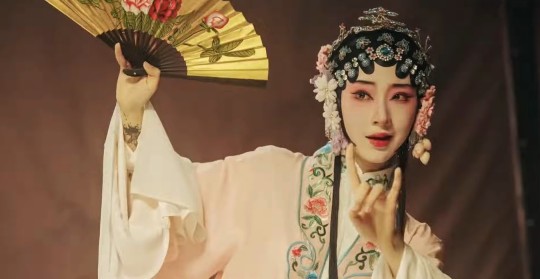
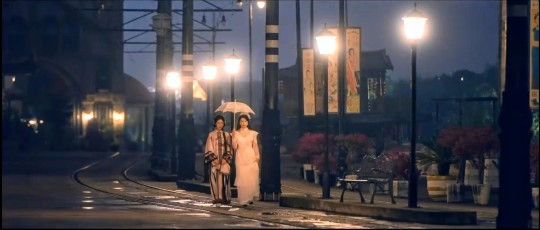


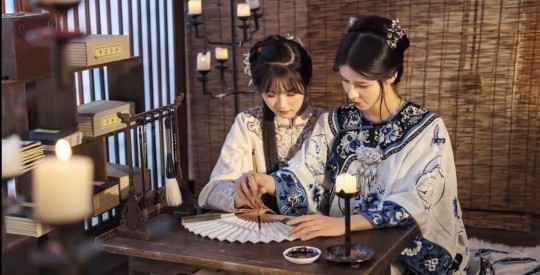
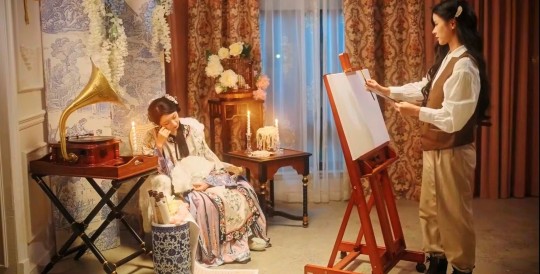
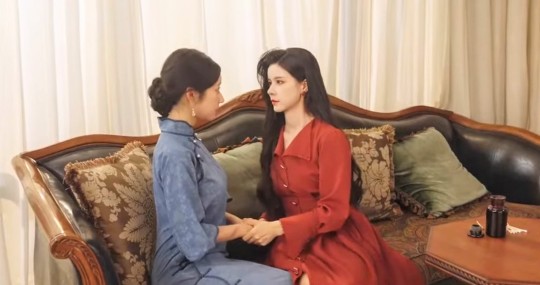
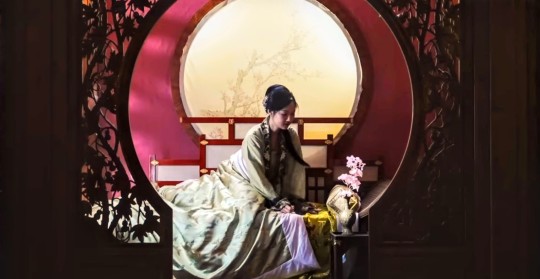
Chinese GL Webseries & Shorts for the Wuxia-Uninclined
Have you ever wanted to venture into the world of Chinese GL webseries and short films, only to find yourself at a loss about where to begin, or intimidated by the unfamiliar tropes and terms of the wuxia genre?
Well, worry no more! Here's a selection of non-wuxia webseries and short films curated by yours truly. Now you too can enjoy the lavish costumes and location shoots of these Chinese productions, so rarely seen in F/F works outside of feature films and the occasional TV series~
By the way, these are all translated and subbed by the inimitable Douqi (@douqi7s), whose immense contribution to the English-language baihe fandom is surely in breach of anti-monopoly laws. Offer up your thanks at her Tumblr and Twitter!
At-a-glance list
Webseries:
Ye-Mu Season 2 (1 hr 20m total, 2023) - standalone
The Vampires (41m total, 2022)
Ye-Mu Season 1 (27m total, 2022) - standalone
The Lost World (1hr 5m total, 2023)
Short films - order corresponding to the pictures above:
A Tale of Yearning (5 mins, 2022)
"She Brought Colour Into My World" (2.5 mins, 2023)
"I'm Her Weapon" (3 mins, 2022)
Miss Shen and the Woman Warlord (6 mins, 2023)
Women's Script (5 mins, 2023)
The Caged Canary (5 mins, 2023)
The Beauty of the Law (6 mins, 2023)
Flowers Bloom; Flowers Wither (9 mins, 2022)
Commentary under the cut!
FYI, I've opted to link directly to the subtitled versions since they're probably more difficult to find than regular anime, TV series, movies etc. If a link is broken, please refer to Douqi's blog directly.
Important note for the uninitiated:
It’s a bit difficult to talk about canonicity in relation to live-action works made in the PRC, as things which would normally be used as evidence of canonicity all fall under the censorship regulations— explicit references to romantic relationships or queerness, declarations of love, kissing etc. are all off the table. So while these may not look canon in the most traditional sense, they are intended to be read as such and should certainly not be dismissed as queerbaiting or yuribait. Also, the creators can get very imaginative, so this is less of a problem than you may think – see the entries on Ye-Mu Season 2 and The Lost World in particular!
1. Ye-Mu Season 2 / 叶穆 2 (32 episodes / 1hr 20m total, 2023, dir. Zhang Zhiwei) - MyDramaList
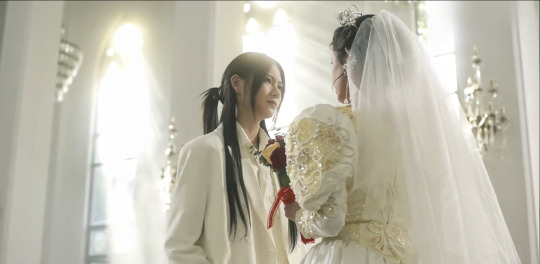
(Note: Despite the name, Ye-Mu Season 2 is completely unrelated to the first season; the only thing the two share is the cast, crew, and focus on Penthouse-style melodrama.)
Determined to take revenge for her mother's death, Xu Baiqing (Sheng Wei) marries a wealthy and much older businessman in the hope of finding evidence to put him behind bars. But first she must assuage the suspicions of his cheerily hostile second daughter, moody youngest son, and estranged eldest daughter (Ye-Mu Zhixia, played by Wang Laoji), the latter of whom Xu Baiqing dated in university and who is currently seething at the sight of her former girlfriend marrying her father...
If you want to get a sense of the potential breadth of Chinese GL webseries, this is a pretty good place to start. It does a decent job of matching the tone and presentation of a melodrama you might catch on TV (and in fact looks higher-budget than some I can think of), while committing to something that can’t be done on TV yet— namely, featuring an F/F exes-to-stepmother storyline and delivering on the drama inherent in such a premise. Of particular note is how the framing and behaviour of Ye-Mu Zhixia is very much consistent with that of a male romantic lead; thanks to some clever writing, it’s basically impossible to deny the nature of her relationship with the main character. They don’t even lean on the plausible deniability afforded by the label of “friendship”— in fact, in an early scene she is incensed when the protagonist refers to her as “[her] only friend”. There are a few caveats – the main character ends up in a lot of scrapes that her ex-girlfriend has to save her from, the reveals are often rather unsurprising, and the story shifts more to a mystery focus around halfway – but it’s still worth checking out if a Korean-style melodrama with an F/F take on a romantic storyline sounds appealing.
(CW: violence, murder, attempted sexual assault)
Note: See The Lost World (below), from the same creative team, for an even more impressive example of Chinese GL pushing the limits of censorship.
Links: MEGA / Internet Archive (compilation)
2. The Vampires / 吸血鬼鬼盲盒 (7 episodes / 41m total, 2022, dir. Zhang Zhiwei) - MyDramaList
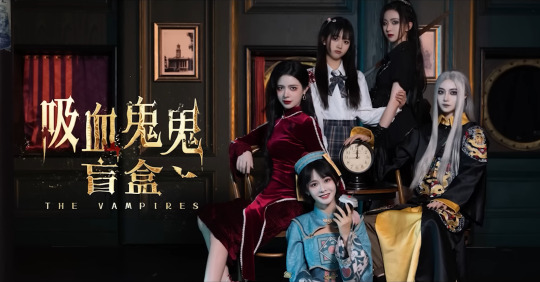
(Note: Spoilers for the first 15 minutes or so, because otherwise the summary would be “They end up locked inside with the monsters on board”, which wouldn’t tell you much more than the title already does)
Every night, Tianyue (Ye Miao/夜喵) has been having dreams about the mysterious cruise ship docked at the pier. Convinced that there is treasure hidden inside, she and her exorcist-cultivator girlfriend Xiao Ling (Wei Miao/微渺) sneak on board only to find that they are trapped there until the sun comes up. Things don’t seem too bad at first: although they run into two vampires – the cute, cheeky Xingming (Yang Fuyu) and her elegant mistress Su Tanya (Sheng Wei) – they are able to call a truce, on the condition that the humans help search the ship for the latter’s beloved (Fu Cha, played by Wang Laoji). But when Fu Cha wakes up without her memories, it is clear that something is terribly wrong, and that the ship and its inhabitants harbour more secrets than expected.
For a webseries, The Vampires takes a while to get started— it’s a bit difficult to tell what kind of story or indeed what kind of tone it’s going for just based on the somewhat campy and comedic first section. But after that wobbly beginning, it manages to pull itself together to tell a compelling – and sometimes genuinely tense – tale about a motley band of humans and vampires, and the truths they have to face together. While the ending is no happily-ever-after, I found it satisfying and hopeful, and surprisingly affecting. Also, a bunch of the characters have real polyam energy, and this is reflected in the narrative beyond mere flirting!
(CW: abusive parents)
Links - MEGA / Internet Archive (compilation) / YouTube (compilation)
3. Ye-Mu Season 1 / 叶穆 (12 episodes / 27m total, 2022, dir. Zhang Zhiwei) - MyDramaList
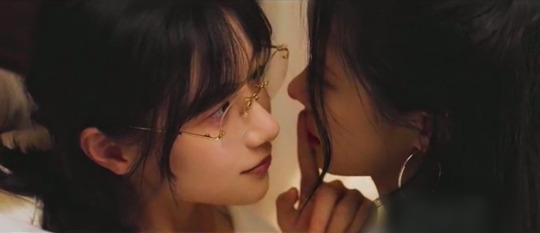
(Note: Ye-Mu Seasons 1 and 2 are standalone stories; each season is entirely self-contained and the second season is not a continuation of the first.)
The head of the Ye-Mu family has died, leaving the next generation to squabble over the inheritance. It's a web of secrets, lies, and hidden resentments, as the characters dig out old grievances and fresh accusations in a desperate attempt to one-up each other. They're tangled up together to an almost incestuous degree, and indeed, the F/F subtext here is the ambiguous relationship between eldest daughter Ye-Mu Nanzhu (Sheng Wei) and second daughter Ye-Mu Nanmo (Wang Laoji) (rest assured that they are at least not biologically related).
Those who prefer darker stories and don't mind the pseudo-incest or other content warnings will find a melodrama which makes good use of its short runtime to deliver on twists, turns, and an explosive - if tragic - conclusion. That being said, the story is about the family drama in general, so do note that while the relationship between Nanzhu and Nanmo is narratively important, it is not fleshed out in great detail and certainly not the focus of the series.
(CW: suicide, ableist trope (spoiler – disabled character turns out to have been faking it), ableist language)
Links - MEGA / Internet Archive (compilation)
4. The Lost World / 夏夜知道风的甜 (1hr 5m total, 2023, dir. Zhang Zhiwei) - MyDramaList

(Note: Spoilers for the purpose of flagging triggering content, as it’s particularly easy to trip into for this show. Also, some vague spoilers for later episodes in order to highlight in order to highlight the themes etc.)
This webseries feels like two shows smushed into one: apart from the very beginning, the first half is a gritty, bullying-focused take on university life, while the second is a true-blue romantic comedy (aside from one blip – see the note below for details). But even if you’re wary of the bullying, I would still recommend watching the back half – which is basically standalone – as it’s a very funny and heartfelt story about two childhood friends finally getting their act together. Without further ado, here’s two blurbs!
From episode 1 onwards: After saving a classmate from the class bully, popular college student Xia Huaichu (Yang Fuyu) is subjected to a lengthy harassment campaign by the latter. She is suddenly faced with having to protect her reputation in the face of false allegations and fake nudes– despite the fact that all she wants to do is focus on reconciling with another classmate, a high school best friend whom she had previously lost touch with (Mu Qingfeng, played by Wang Laoji). From episode 14 onwards: Childhood friends Xia Huaichu (Yang Fuyu) and Mu Qingfeng (Wang Laoji) are caught in a weird gay purgatory where each has feelings for the other, and suspects that the other has feelings for them too. But both are exceedingly stubborn and want the other one to take the initiative in confessing, leading to ridiculous displays of I-don’t-care-isms and lots and lots of UST. (Does anybody use that term anymore??)
As you may have guessed, I’m not too keen on the first part of this show, nor the decidedly unnecessary attempted rape segment, though that’s partly on me for not checking the content warnings beforehand. And yet I’m very glad to have stuck with it, because the second half is not only hilarious, but also a masterclass in censorship-dodging that needs to be seen to be believed. Not just in terms of the suggestive scenes, of which there are many, either— the story is literally about two women starting a relationship and having to reckon with parental disapproval, homophobia, and other obstacles which platonic friends wouldn’t have to deal with. I honestly don’t know how this ever got approved, and can only applaud. Bravo.
Note: For those who want to avoid the triggering content, I’d recommend starting at episode 14, but make sure to skip episodes 19 and 20 as there is a foiled rape attempt.
(CW for entire series: bullying (incl. violence, fake nudes), sexual harassment, attempted sexual assault, fatphobic language, homophobia
CW for episodes 14-24: attempted sexual assault in episodes 19-20, homophobia)
Links - MEGA / Dropbox
SHORT FILMS

Quick note: Click on the English titles for the subtitled versions, and the Chinese titles (which are really just the video titles) for the originals. And yes, although the majority of these are shampoo commercials, they really do hold up as short films in their own right. Give them a try, you might be surprised!
A Tale of Yearning / 一见误终生,不见终生误 (5 mins, 2022, dir. Liu Yun Rui/流云蕊) – A bittersweet story about a literature-minded young woman (Sheng Wei) and a Chinese opera performer (Ai Ye) who bond over their love of fiction, only to be torn apart by harsh reality. Tragic ending, but I liked the more literary turn of the dialogue. Shampoo ad. (CW: homophobia)
“She Brought Colour Into My World” / “她走后,我的世界又失去了颜色” (2.5 mins, 2023, dir. Zou Hui Qu Le/走回去了) – A very restrained short film (actually, more like a music video) set during the late Qing era, wherein a sheltered young woman (Xiao Yu Za/小宇咂) falls for her female neighbour, recently returned from studying abroad (Sheng Wei). Lovely use of music and visuals to create a dreamlike atmosphere. Tragic ending. Not a shampoo ad.
“I’m Her Weapon” / 我是你手里的一把刀 (3 mins, 2022, dir. Liu Yun Rui/流云蕊) – A moody, interior piece about an assassin (Ai Ye) who yearns for some sign of affection from her handler (Sheng Wei), only to be left devastated by her new assignment. Surprisingly not a shampoo ad.
Miss Shen and the Woman Warlord / 我们是孤独行走的钟,但也要做敲响希望的钟 (6 mins, 2023, dir. Liu Yun Rui/流云蕊) – I’d like to describe this as being inspired by the story of Mai Jia’s novel The Message and the aesthetics of Kawashima Yoshiko (1990), but most Tumblr users would probably find those references deeply unhelpful. Basically, a female spy (Sheng Wei) disguises herself as a male soldier and infiltrates the mansion of a Republican warlord. There, she meets the warlord’s daughter (Ai Ye), who quickly realises that there is more to the promising young officer than meets the eye. Shampoo ad.
Women’s Script / 纵使“科考”无女子,无碍红袖书香,星辰有光 (5 mins, 2023, dir. Liu Yun Rui/流云蕊) – While sailing down a river, a girl (Zhi Chun He/至春禾) catches sight of a woman writing poetry on the riverbank (Sheng Wei), and is fascinated by both her beauty and her flaunting of the rules against women’s literacy. Shampoo ad. (CW: domestic violence)
The Caged Canary / 如果这是一场骗局,那我也只愿意输给你 (5 mins, 2023, dir. Liu Yun Rui/流云蕊) – The protagonist (Ai Ye) is sent by her parents to beguile a wealthy young man into marriage, but ends up developing feelings for his modern-woman sister (Sheng Wei) instead. Shampoo ad. (CW: attempted sexual assault)
Flowers Bloom; Flowers Wither / 她们一个被铁链禁锢,一个被男装束缚,直到救赎彼此 (9 mins, 2022, dir. Qian Li Min/千里明) – Takes the romance between a cross-dressing noblewoman (Du Ruo/杜若) and her supposedly-mad stepmother (Rou Lian Cheng/肉脸橙) to tell a story about the restrictions placed on women in historical times, and how resistance, even when futile, can still have meaning. Tragic ending, obviously. Not a shampoo ad. (CW: domestic violence, misogyny, accidental misgendering, gender dysphoria)
#sapphic#lesbian#gay#wlw#baihe#chinese gl#yuri#gl series#wlw series#short films#wlw recommendations#ye mu#wicked wealthy women#the vampires 2022#the lost world 2023#xia ye zhi dao feng zhi tian#zhang zhiwei#liu yun rui#wang laoji#wang xuexi#sheng wei#yang fuyu#ai ye#list
311 notes
·
View notes
Text
East Palace, West Palace in ep5 of Blue Canvas of Youthful Days
I have been punched in the solar plexus by Blue Canvas of Youthful Days episode 5. So much happens in that episode that is overwhelming, from Qi Lu setting up a Netflix-and-chill date with the clear intention of making a move, to his putting on the famous film East Palace, West Palace (1996), to Qi Lu hiding Qin Xiao in the closet, to Qi Lu's panic at his father realizing he's been lied to, to the devastatingly practiced way Teacher Liu steps to Qi Lu being abused and handles his father, to the way Qi Lu shuts down, to the way QIn Xiao keeps sending mixed signals and Qi Lu calls him on it directly. And nobody else in this episode let me rest either; Tan Fan trying to ask Teacher Liu to wait for him and Liu brushing him off AGAIN, and Turtle trying to call out
@lurkingshan was already more coherent than I can be right now about what happened in the episode in her post.
So instead I want to focus on some queer cinema history that this episode evoked by using East Palace, West Palace as the film that Qi Lu shows to QIn Xiao.
For those who don't know, EPWP is considered to be the first realistic depiction of a gay man in film by a mainland Chinese production. It is to my knowledge the first time a gay man says "I love you" to another man on screen. It was made before being gay was decriminalized in China (1997), and it was filmed by an independent production company and smuggled out of China to France in order to be finished and distributed. It ended up at the Cannes festival in 1997, but the director's passport was seized and he was placed under house arrest to prevent him from attending. Despite pressure to pull the film, it still aired that year. In 1998, the Film Law was passed to prevent anyone from making films outside of the studio system (and therefore censorship review), effectively preventing anything like EPWP from being made in the future.
The film is about a gay man who cruises in the notorious bathrooms in the parks on either side of Tiananmen Square getting harassed by police officers (a situation extremely familiar to the historical queer experience in Canada [where I'm from] as well) and playing what I'd describe as a psychological game with one of them; A Lan kisses the cop, runs, and then gets caught a second time, and uses the second police confession as an excuse to tell his life's story in the public record, all while pushing the police officer a little further into deviance. As far as I'm aware, this film has been banned in China since being made and never shown (please correct me if I'm wrong about that!).
This is hitting me hard because of the much more recent history of Blue Canvas of Youthful Days itself. As most of you know, but I'll capture here for posterity, episodes 1-4 of this show aired on iQIYI (a China-based app) on August 6, and within 24 hours they were pulled from the app with no information about the future episodes being shown. When I watched episode 5 today, after waiting for it for 3 months, I was immediately hit with a wave of anger that this gorgeous, emotionally moving and powerful episode had been held back from public consumption for months, for the same reasons that the film being shown within the episode had been withheld from viewing in its own country.
Censorship is such an ugly thing, it's hard to articulate but the emotions around it are so strong because we know, when they pull or refuse to show media that depicts our lives, it's because they don't want our lives to be real; they don't want us to exist. It's a very real threat. And to have this episode--which is all about an abused boy who is in very real danger but so bravely insisting that he shoot his shot and take his best chance at love and happiness anyway, using the iconic confession scene from one of the most famous banned films in Chinese queer cinema history to do it--to have this episode be the one that was prevented from airing......I am overwhelmed.
In the scenes they watch in episode 5, A Lan tries to prevent the officer from uncuffing him, and then the officer lets him go, but A Lan doesn't go far and comes back. He declares his love to the officer's face, and demands that his love be acknowledged and not dismissed. And the officer does not know what to do with it and reacts with violence, which is partially what A Lan has been angling at all along. The show really played with this by having all three of the couples in the show stymied by having their overtures dismissed this episode, but we almost didn't get to see it.
I'm so grateful this got distribution now, and on multiple platforms. Blue Canvas of Youthful Days is airing Saturdays and Sundays on GagaOOLala and Youtube (note, as per @thisonelikesaliens's excellent language posts, the subs on Gaga are much better), and on Mondays on Viki. I know there is an avalanche of content right now, but this show is so good and worked so hard to make it to us, please give it some love!
#blue canvas of youthful days#east palace west palace (1996)#typed so that i can stop thinking it#queer history
87 notes
·
View notes
Text
So for those unaware of what just went down, a whistleblower has exposed that last year the American / Canadian / and UK comity of the Hugo Awards deliberately removed some nominations specifically because those nominations might offend the Chinese government.
The Hugo Awards (until now) were a very respected scifi / fantasy award. In years past Neil Gaiman had won Hugo awards for such things as The Sandman: Overture and other works.
However the nominations removed last year to avoid offending China included episode 6 of the Netflix adaptation of Neil Gaiman's The Sandman, likely because it showed Death taking souls to the afterlife. The Chinese government does not like Western depictions of the afterlife.
This has blown up into a very big and interesting scandal and now Neil Gaiman and The Sandman Netflix series are part of it.
I grew tired of Hollywood pandering to China years ago when I found out that's why so many horror reboots removed supernatural elements (i.e. the Child's Play remake turning Chucky into an evil AI robot doll instead of a possessed talking doll).
The Chinese market does not like western depictions of ghosts or the afterlife and this has lead to a steep decrease in high budget supernatural horror and why most horror is now made by smaller, low-budget divisions like Blumhouse.
Disney couldn't even put a Haunted Mansion in Hong Kong Disney. Instead it's "Mystic Manor" which isn't haunted at all but just "enchanted" with "living furniture." The popular excuse they give is that the Chinese culture has different views on ghosts than us. Bull. I've read plenty of scary Chinese ghost stories. And they don't mind western depictions of ghosts if they happen to be in Korean or Japanese animation.
155 notes
·
View notes
Text
Okay so you know how in chinese boothill's swears are translated into sweet sounding words like baby?
what if boothill, taking advantage of the censorship on his beacon, starts calling dan heng "baby" for real. Like everytime he says it dan heng just assumes "oh its just his synesthesia beacon" but no boothill is just out here calling him every endearment under the sun and everyone is none the wiser.
"Whatever you say, babe" Boothill says. Dan heng frowns. "Stop swearing at me."
BUT HES NOT HE JUST LIKES DAN HENG A LOT.
anyway one day they manage to fix his beacon ("fuck yeah!") and boothill thinks its amazing. he just forgot one minor detail.
Bro calls dan heng babe out of the blue on like a sunday morning expecting another none reaction and danheng.exe is FLUSTERED. he broke him. somehow this ends in a confession.
118 notes
·
View notes
Text
The antitrust case against Apple
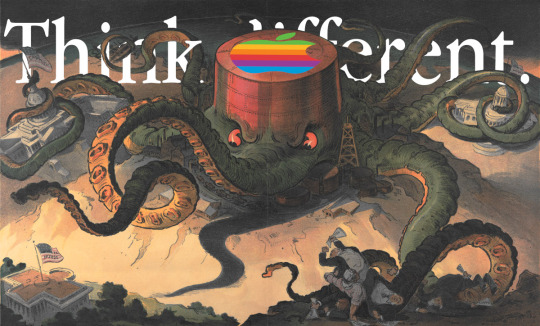
I'm on tour with my new, nationally bestselling novel The Bezzle! Catch me TONIGHT (Mar 22) in TORONTO, then SUNDAY (Mar 24) with LAURA POITRAS in NYC, then Anaheim, and beyond!

The foundational tenet of "the Cult of Mac" is that buying products from a $3t company makes you a member of an oppressed ethnic minority and therefore every criticism of that corporation is an ethnic slur:
https://pluralistic.net/2024/01/12/youre-holding-it-wrong/#if-dishwashers-were-iphones
Call it "Apple exceptionalism" – the idea that Apple, alone among the Big Tech firms, is virtuous, and therefore its conduct should be interpreted through that lens of virtue. The wellspring of this virtue is conveniently nebulous, which allows for endless goal-post shifting by members of the Cult of Mac when Apple's sins are made manifest.
Take the claim that Apple is "privacy respecting," which is attributed to Apple's business model of financing its services though cash transactions, rather than by selling it customers to advertisers. This is the (widely misunderstood) crux of the "surveillance capitalism" hypothesis: that capitalism is just fine, but once surveillance is in the mix, capitalism fails.
Apple, then, is said to be a virtuous company because its behavior is disciplined by market forces, unlike its spying rivals, whose ability to "hack our dopamine loops" immobilizes the market's invisible hand with "behavior-shaping" shackles:
http://pluralistic.net/HowToDestroySurveillanceCapitalism
Apple makes a big deal out of its privacy-respecting ethos, and not without some justification. After all, Apple went to the mattresses to fight the FBI when they tried to force Apple to introduced defects into its encryption systems:
https://www.eff.org/deeplinks/2018/04/fbi-could-have-gotten-san-bernardino-shooters-iphone-leadership-didnt-say
And Apple gave Ios users the power to opt out of Facebook spying with a single click; 96% of its customers took them up on this offer, costing Facebook $10b (one fifth of the pricetag of the metaverse boondoggle!) in a single year (you love to see it):
https://arstechnica.com/gadgets/2021/02/facebook-makes-the-case-for-activity-tracking-to-ios-14-users-in-new-pop-ups/
Bruce Schneier has a name for this practice: "feudal security." That's when you cede control over your device to a Big Tech warlord whose "walled garden" becomes a fortress that defends you against external threats:
https://pluralistic.net/2021/06/08/leona-helmsley-was-a-pioneer/#manorialism
The keyword here is external threats. When Apple itself threatens your privacy, the fortress becomes a prison. The fact that you can't install unapproved apps on your Ios device means that when Apple decides to harm you, you have nowhere to turn. The first Apple customers to discover this were in China. When the Chinese government ordered Apple to remove all working privacy tools from its App Store, the company obliged, rather than risk losing access to its ultra-cheap manufacturing base (Tim Cook's signal accomplishment, the one that vaulted him into the CEO's seat, was figuring out how to offshore Apple manufacturing to China) and hundreds of millions of middle-class consumers:
https://www.reuters.com/article/us-china-apple-vpn/apple-says-it-is-removing-vpn-services-from-china-app-store-idUSKBN1AE0BQ
Killing VPNs and other privacy tools was just for openers. After Apple caved to Beijing, the demands kept coming. Next, Apple willingly backdoored all its Chinese cloud services, so that the Chinese state could plunder its customers' data at will:
https://www.nytimes.com/2021/05/17/technology/apple-china-censorship-data.html
This was the completely foreseeable consequence of Apple's "curated computing" model: once the company arrogated to itself the power to decide which software you could run on your own computer, it was inevitable that powerful actors – like the Chinese Communist Party – would lean on Apple to exercise that power in service to its goals.
Unsurprisingly, the Chinese state's appetite for deputizing Apple to help with its spying and oppression was not sated by backdooring iCloud and kicking VPNs out of the App Store. As recently as 2022, Apple continued to neuter its tools at the behest of the Chinese state, breaking Airdrop to make it useless for organizing protests in China:
https://pluralistic.net/2022/11/11/foreseeable-consequences/#airdropped
But the threat of Apple turning on its customers isn't limited to China. While the company has been unwilling to spy on its users on behalf of the US government, it's proven more than willing to compromise its worldwide users' privacy to pad its own profits. Remember when Apple let its users opt out of Facebook surveillance with one click? At the very same time, Apple was spinning up its own commercial surveillance program, spying on Ios customers, gathering the very same data as Facebook, and for the very same purpose: to target ads. When it came to its own surveillance, Apple completely ignored its customers' explicit refusal to consent to spying, spied on them anyway, and lied about it:
https://pluralistic.net/2022/11/14/luxury-surveillance/#liar-liar
Here's the thing: even if you believe that Apple has a "corporate personality" that makes it want to do the right thing, that desire to be virtuous is dependent on the constraints Apple faces. The fact that Apple has complete legal and technical control over the hardware it sells – the power to decide who can make software that runs on that hardware, the power to decide who can fix that hardware, the power to decide who can sell parts for that hardware – represents an irresistible temptation to enshittify Apple products.
"Constraints" are the crux of the enshittification hypothesis. The contagion that spread enshittification to every corner of our technological world isn't a newfound sadism or indifference among tech bosses. Those bosses are the same people they've always been – the difference is that today, they are unconstrained.
Having bought, merged or formed a cartel with all their rivals, they don't fear competition (Apple buys 90+ companies per year, and Google pays it an annual $26.3b bribe for default search on its operating systems and programs).
Having captured their regulators, they don't fear fines or other penalties for cheating their customers, workers or suppliers (Apple led the coalition that defeated dozens of Right to Repair bills, year after year, in the late 2010s).
Having wrapped themselves in IP law, they don't fear rivals who make alternative clients, mods, privacy tools or other "adversarial interoperability" tools that disenshittify their products (Apple uses the DMCA, trademark, and other exotic rules to block third-party software, repair, and clients).
True virtue rests not merely in resisting temptation to be wicked, but in recognizing your own weakness and avoiding temptation. As I wrote when Apple embarked on its "curated computing" path, the company would eventually – inevitably – use its power to veto its customers' choices to harm those customers:
https://memex.craphound.com/2010/04/01/why-i-wont-buy-an-ipad-and-think-you-shouldnt-either/
Which is where we're at today. Apple – uniquely among electronics companies – shreds every device that is traded in by its customers, to block third parties from harvesting working components and using them for independent repair:
https://www.vice.com/en/article/yp73jw/apple-recycling-iphones-macbooks
Apple engraves microscopic Apple logos on those parts and uses these as the basis for trademark complaints to US customs, to block the re-importation of parts that escape its shredders:
https://repair.eu/news/apple-uses-trademark-law-to-strengthen-its-monopoly-on-repair/
Apple entered into an illegal price-fixing conspiracy with Amazon to prevent used and refurbished devices from being sold in the "world's biggest marketplace":
https://pluralistic.net/2022/11/10/you-had-one-job/#thats-just-the-as
Why is Apple so opposed to independent repair? Well, they say it's to keep users safe from unscrupulous or incompetent repair technicians (feudal security). But when Tim Cook speaks to his investors, he tells a different story, warning them that the company's profits are threatened by customers who choose to repair (rather than replace) their slippery, fragile glass $1,000 pocket computers (the fortress becomes a prison):
https://www.apple.com/newsroom/2019/01/letter-from-tim-cook-to-apple-investors/
All this adds up to a growing mountain of immortal e-waste, festooned with miniature Apple logos, that our descendants will be dealing with for the next 1,000 years. In the face of this unspeakable crime, Apple engaged in a string of dishonest maneuvers, claiming that it would support independent repair. In 2022, Apple announced a home repair program that turned out to be a laughably absurd con:
https://pluralistic.net/2022/05/22/apples-cement-overshoes/
Then in 2023, Apple announced a fresh "pro-repair" initiative that, once again, actually blocked repair:
https://pluralistic.net/2023/09/22/vin-locking/#thought-differently
Let's pause here a moment and remember that Apple once stood for independent repair, and celebrated the independent repair technicians that kept its customers' beloved Macs running:
https://pluralistic.net/2021/10/29/norwegian-potato-flour-enchiladas/#r2r
Whatever virtue lurks in Apple's corporate personhood, it is no match for the temptation that comes from running a locked-down platform designed to capture IP rights so that it can prevent normal competitive activities, like fixing phones, processing payments, or offering apps.
When Apple rolled out the App Store, Steve Jobs promised that it would save journalism and other forms of "content creation" by finally giving users a way to pay rightsholders. A decade later, that promise has been shattered by the app tax – a 30% rake on every in-app transaction that can't be avoided because Apple will kick your app out of the App Store if you even mention that your customers can pay you via the web in order to avoid giving a third of their content dollars to a hardware manufacturer that contributed nothing to the production of that material:
https://www.eff.org/deeplinks/2023/06/save-news-we-must-open-app-stores
Among the apps that Apple also refuses to allow on Ios is third-party browsers. Every Iphone browser is just a reskinned version of Apple's Safari, running on the same antiquated, insecure Webkit browser engine. The fact that Webkit is incomplete and outdated is a feature, not a bug, because it lets Apple block web apps – apps delivered via browsers, rather than app stores:
https://pluralistic.net/2022/12/13/kitbashed/#app-store-tax
Last month, the EU took aim at Apple's veto over its users' and software vendors' ability to transact with one another. The newly in-effect Digital Markets Act requires Apple to open up both third-party payment processing and third-party app stores. Apple's response to this is the very definition of malicious compliance, a snake's nest of junk-fees, onerous terms of service, and petty punitive measures that all add up to a great, big "Go fuck yourself":
https://pluralistic.net/2024/02/06/spoil-the-bunch/#dma
But Apple's bullying, privacy invasion, price-gouging and environmental crimes are global, and the EU isn't the only government seeking to end them. They're in the firing line in Japan:
https://asia.nikkei.com/Business/Technology/Japan-to-crack-down-on-Apple-and-Google-app-store-monopolies
And in the UK:
https://www.gov.uk/government/news/cma-wins-appeal-in-apple-case
And now, famously, the US Department of Justice is coming for Apple, with a bold antitrust complaint that strikes at the heart of Apple exceptionalism, the idea that monopoly is safer for users than technological self-determination:
https://www.justice.gov/opa/media/1344546/dl?inline
There's passages in the complaint that read like I wrote them:
Apple wraps itself in a cloak of privacy, security, and consumer preferences to justify its anticompetitive conduct. Indeed, it spends billions on marketing and branding to promote the self-serving premise that only Apple can safeguard consumers’ privacy and security interests. Apple selectively compromises privacy and security interests when doing so is in Apple’s own financial interest—such as degrading the security of text messages, offering governments and certain companies the chance to access more private and secure versions of app stores, or accepting billions of dollars each year for choosing Google as its default search engine when more private options are available. In the end, Apple deploys privacy and security justifications as an elastic shield that can stretch or contract to serve Apple’s financial and business interests.
After all, Apple punishes its customers for communicating with Android users by forcing them to do so without any encryption. When Beeper Mini rolled out an Imessage-compatible Android app that fixed this, giving Iphone owners the privacy Apple says they deserve but denies to them, Apple destroyed Beeper Mini:
https://blog.beeper.com/p/beeper-moving-forward
Tim Cook is on record about this: if you want to securely communicate with an Android user, you must "buy them an Iphone":
https://www.theverge.com/2022/9/7/23342243/tim-cook-apple-rcs-imessage-android-iphone-compatibility
If your friend, family member or customer declines to change mobile operating systems, Tim Cook insists that you must communicate without any privacy or security.
Even where Apple tries for security, it sometimes fails ("security is a process, not a product" -B. Schneier). To be secure in a benevolent dictatorship, it must also be an infallible dictatorship. Apple's far from infallible: Eight generations of Iphones have unpatchable hardware defects:
https://checkm8.info/
And Apple's latest custom chips have secret-leaking, unpatchable vulnerabilities:
https://arstechnica.com/security/2024/03/hackers-can-extract-secret-encryption-keys-from-apples-mac-chips/
Apple's far from infallible – but they're also far from benevolent. Despite Apple's claims, its hardware, operating system and apps are riddled with deliberate privacy defects, introduce to protect Apple's shareholders at the expense of its customers:
https://proton.me/blog/iphone-privacy
Now, antitrust suits are notoriously hard to make, especially after 40 years of bad-precedent-setting, monopoly-friendly antitrust malpractice. Much of the time, these suits fail because they can't prove that tech bosses intentionally built their monopolies. However, tech is a written culture, one that leaves abundant, indelible records of corporate deliberations. What's more, tech bosses are notoriously prone to bragging about their nefarious intentions, committing them to writing:
https://pluralistic.net/2023/09/03/big-tech-cant-stop-telling-on-itself/
Apple is no exception – there's an abundance of written records that establish that Apple deliberately, illegally set out to create and maintain a monopoly:
https://www.wired.com/story/4-internal-apple-emails-helped-doj-build-antitrust-case/
Apple claims that its monopoly is beneficent, used to protect its users, making its products more "elegant" and safe. But when Apple's interests conflict with its customers' safety and privacy – and pocketbooks – Apple always puts itself first, just like every other corporation. In other words: Apple is unexceptional.
The Cult of Mac denies this. They say that no one wants to use a third-party app store, no one wants third-party payments, no one wants third-party repair. This is obviously wrong and trivially disproved: if no Apple customer wanted these things, Apple wouldn't have to go to enormous lengths to prevent them. The only phones that an independent Iphone repair shop fixes are Iphones: which means Iphone owners want independent repair.
The rejoinder from the Cult of Mac is that those Iphone owners shouldn't own Iphones: if they wanted to exercise property rights over their phones, they shouldn't have bought a phone from Apple. This is the "No True Scotsman" fallacy for distraction-rectangles, and moreover, it's impossible to square with Tim Cook's insistence that if you want private communications, you must buy an Iphone.
Apple is unexceptional. It's just another Big Tech monopolist. Rounded corners don't preserve virtue any better than square ones. Any company that is freed from constraints – of competition, regulation and interoperability – will always enshittify. Apple – being unexceptional – is no exception.

Name your price for 18 of my DRM-free ebooks and support the Electronic Frontier Foundation with the Humble Cory Doctorow Bundle.

If you'd like an essay-formatted version of this post to read or share, here's a link to it on pluralistic.net, my surveillance-free, ad-free, tracker-free blog:
https://pluralistic.net/2024/03/22/reality-distortion-field/#three-trillion-here-three-trillion-there-pretty-soon-youre-talking-real-money
#pluralistic#apple#antitrust#cult of mac#ios#mobile#app tax#infosec#feudal security#doj#jonathan kanter#doj v apple#big tech#trustbusting#monopolies#app stores#technofeudalism#technomaorialism#privacy#right to repair#corruption
238 notes
·
View notes